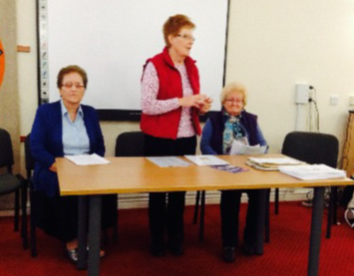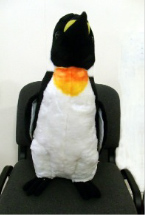 Committed to our vowed life for mission, we will explore changes of structure and language in our ‘membership-leadership relationship’ that will enable a more integrated and prophetic contribution to mission. (General Chapter 2014)
Committed to our vowed life for mission, we will explore changes of structure and language in our ‘membership-leadership relationship’ that will enable a more integrated and prophetic contribution to mission. (General Chapter 2014)
This statement from the General Chapter is more than a simple recommendation and was seen as such by the Leadership Team in Britain and Ireland. Over the past year, a series of workshops has been held in the Unit to explore, in depth, the meaning and implications of co-responsibility, collaboration, and accountability among members and leaders. Understanding is growing that, through interrelatedness in this way, our efforts for the common mission can be truly at the service of communion.
Then came the second step
Meeting of the Extended Leadership Team:
The title is expressive of a new language. The meeting took place in Crewe (England) from 20 – 22 November. At it were the Unit Leadership Team and the other Teams of Participation. The aim of this meeting, planned at the Unit Chapter a year ago, was “to review the work of the teams since then and, if necessary, to revise our mandates and reformulate strategies in order to achieve our aims”.
We have already read Gemma’s letter to the Unit in which she gives an account of this meeting. For those readers who have not had the opportunity to read it, we repeat her account here.  The meeting began with a time of prayer and the telling of a story by means of a PowerPoint presentation. The story, entitled “Our iceberg is melting”, is about a colony of giant penguins living in the Antarctic. One particular penguin called Fred is a contemplative bird, devoted to the study of his environment and always on the lookout for danger. Gradually he notices that their home, where they have lived happily for many years is in grave danger of melting. He brings his fears to the leaders of the colony. They listen to his concerns and call a meeting to inform every one of the danger. Scouts are sent out to search for a safer home and eventually the whole culture of the colony changes. Instead of being settled and always returning to the same place to breed, they become nomadic, moving frequently from one iceberg to another as soon as they realise they are in danger.
The meeting began with a time of prayer and the telling of a story by means of a PowerPoint presentation. The story, entitled “Our iceberg is melting”, is about a colony of giant penguins living in the Antarctic. One particular penguin called Fred is a contemplative bird, devoted to the study of his environment and always on the lookout for danger. Gradually he notices that their home, where they have lived happily for many years is in grave danger of melting. He brings his fears to the leaders of the colony. They listen to his concerns and call a meeting to inform every one of the danger. Scouts are sent out to search for a safer home and eventually the whole culture of the colony changes. Instead of being settled and always returning to the same place to breed, they become nomadic, moving frequently from one iceberg to another as soon as they realise they are in danger.
The story is about change. As we know, change is happening all around us at an unprecedented speed. Unless we are open to change there is a danger of us being happily settled in our closed little world and thus becoming totally irrelevant. We need to be willing to move out of our comfort zones and reach out to those who call to us for help.
The story, based on a book by John Kotter, a change management consultant from Harvard University, outlines eight steps to needed change:
1. Develop a sense of URGENCY. Suffering can’t wait until we feel we are ready. Now is the time to act; tomorrow may be too late.
2. Assemble TEAMS who will work together to achieve our goals.
3. What motivates us is our VISION. In our case it is the vision of Jesus – the Kindom of God;
God’s dream of gathering all into the one Family of brothers and sisters.
4. We must relentlessly COMMUNICATE the vision so that all our members are totally committed and
working together.
5. We need to EMPOWER one another to work for change by delegating and removing obstacles.
6. We need to celebrate SHORT TERM VICTORIES but not be tempted to sink back into complacency.
7. We need to keep up the momentum. DON’T STOP.
8. Do everything we can to integrate the changes into our CULTURE.
Although this model is mainly for businesses, we felt it had something to say to us. Fred the brave penguin taught us a few valuable lessons:
? spend time in contemplation so as to be aware of the needs around us and offer an effective response; speak out our truth and gather support from all our members;
? never go it alone.
We need each other as, guided by our vision and by God Alone, we move out of our comfort zones to build that new society spoken of by our Founder. We also talked about how this model could be seen in the life of Jesus and how he set about realising his mission to establish the reign of God on earth.
The second day of the meeting was taken up with reports from all the teams; work in small mixed groups and then in our teams to revisit our mandates and revise them where necessary. The meeting ended with a prayer of recommitment.
We are now more acutely aware that we are all responsible for leadership within the unit and therefore we regard the teams as an extension of the unit leadership team.
A Participant’s comment on the weekend:
Worthwhile, plenty of energy around, enthusiasm, good atmosphere, willingness to listen, good to feel trusted and responsible for leadership (extended leadership team member); important to hear what other team members are doing; hopeful; strengthened and encouraged by the whole team effort.
